The Qing Dynasty, Opium Wars, and the Rise of Modern China: A Study
VerifiedAdded on 2022/08/26
|9
|1684
|28
Essay
AI Summary
This essay delves into the history of the Qing Dynasty, examining its establishment, challenges like population growth, and the reasons behind the Opium Wars. It outlines China's rich economic history, the rise of the Qing Dynasty, and the impact of Western influence. The essay explores the causes of the Opium Wars, including the illegal opium trade by the British East India Company, the conflicts, and the resulting treaties like the Treaty of Nanjing. It discusses the social consequences of opium addiction and concludes by analyzing different perspectives on the Opium Wars' causes and their impact on Chinese society, ultimately leading to the end of Imperial China. The study uses multiple sources to establish the historical context of the events and their effect on China's modern history.
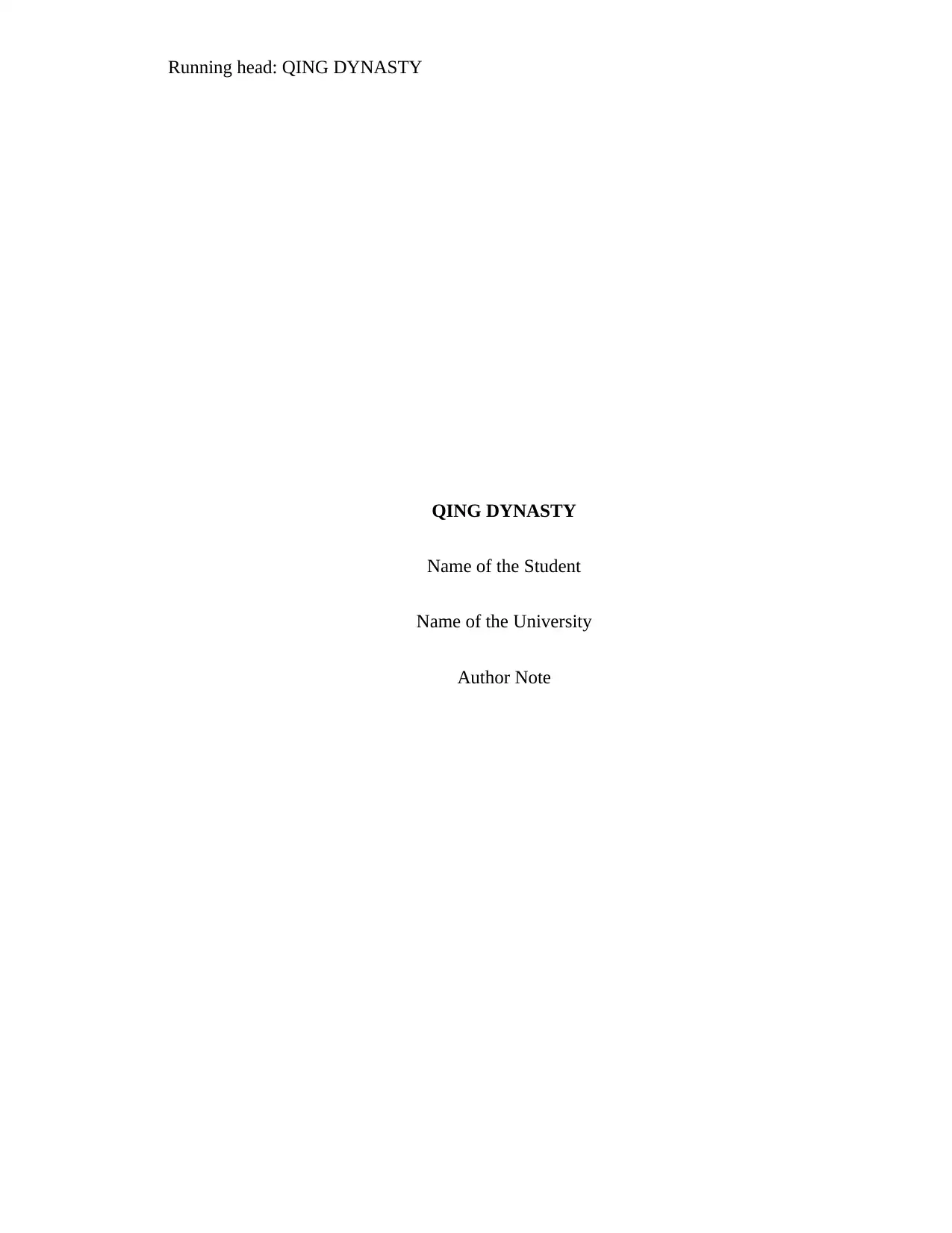
Running head: QING DYNASTY
QING DYNASTY
Name of the Student
Name of the University
Author Note
QING DYNASTY
Name of the Student
Name of the University
Author Note
Paraphrase This Document
Need a fresh take? Get an instant paraphrase of this document with our AI Paraphraser
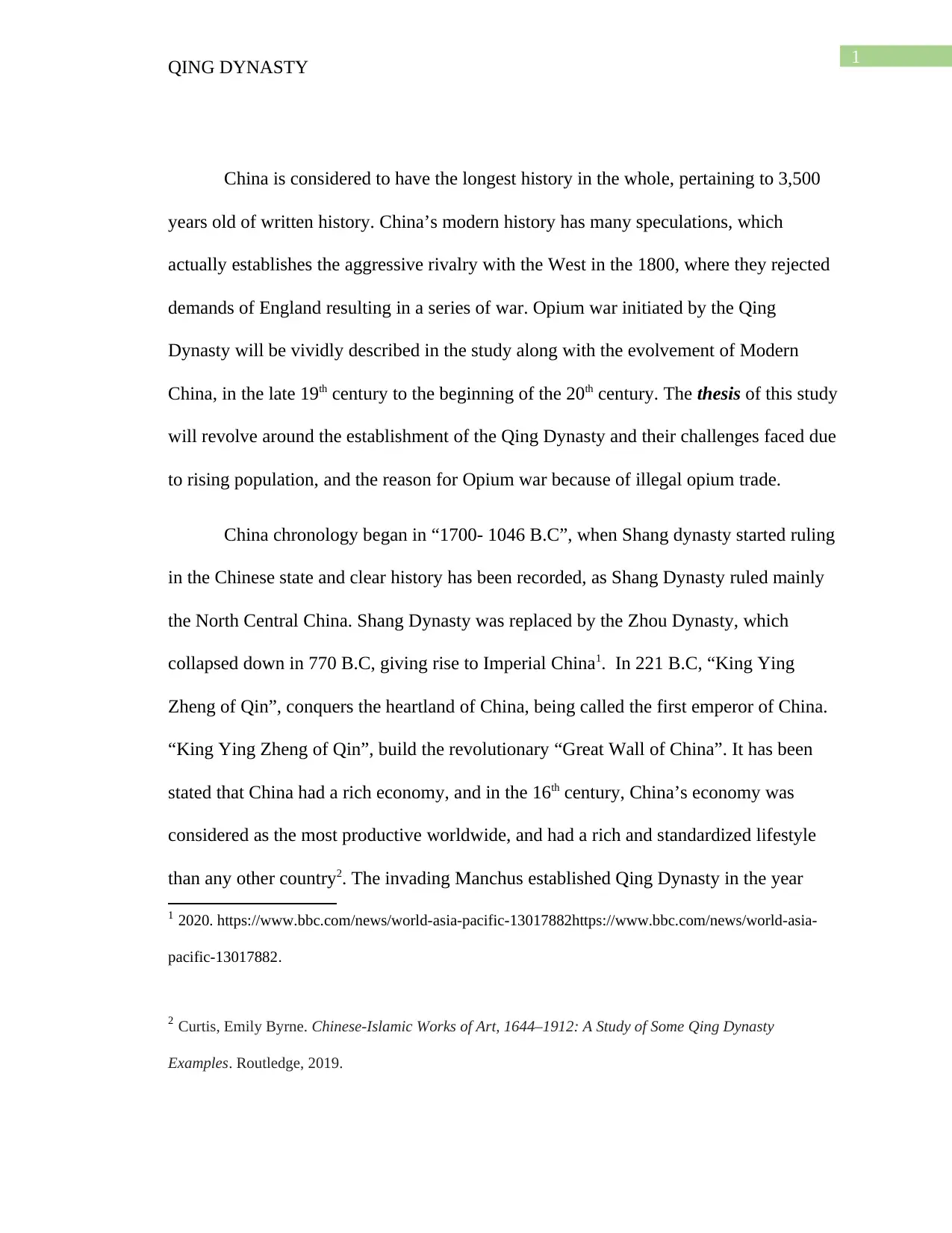
1
QING DYNASTY
China is considered to have the longest history in the whole, pertaining to 3,500
years old of written history. China’s modern history has many speculations, which
actually establishes the aggressive rivalry with the West in the 1800, where they rejected
demands of England resulting in a series of war. Opium war initiated by the Qing
Dynasty will be vividly described in the study along with the evolvement of Modern
China, in the late 19th century to the beginning of the 20th century. The thesis of this study
will revolve around the establishment of the Qing Dynasty and their challenges faced due
to rising population, and the reason for Opium war because of illegal opium trade.
China chronology began in “1700- 1046 B.C”, when Shang dynasty started ruling
in the Chinese state and clear history has been recorded, as Shang Dynasty ruled mainly
the North Central China. Shang Dynasty was replaced by the Zhou Dynasty, which
collapsed down in 770 B.C, giving rise to Imperial China1. In 221 B.C, “King Ying
Zheng of Qin”, conquers the heartland of China, being called the first emperor of China.
“King Ying Zheng of Qin”, build the revolutionary “Great Wall of China”. It has been
stated that China had a rich economy, and in the 16th century, China’s economy was
considered as the most productive worldwide, and had a rich and standardized lifestyle
than any other country2. The invading Manchus established Qing Dynasty in the year
1 2020. https://www.bbc.com/news/world-asia-pacific-13017882https://www.bbc.com/news/world-asia-
pacific-13017882.
2 Curtis, Emily Byrne. Chinese-Islamic Works of Art, 1644–1912: A Study of Some Qing Dynasty
Examples. Routledge, 2019.
QING DYNASTY
China is considered to have the longest history in the whole, pertaining to 3,500
years old of written history. China’s modern history has many speculations, which
actually establishes the aggressive rivalry with the West in the 1800, where they rejected
demands of England resulting in a series of war. Opium war initiated by the Qing
Dynasty will be vividly described in the study along with the evolvement of Modern
China, in the late 19th century to the beginning of the 20th century. The thesis of this study
will revolve around the establishment of the Qing Dynasty and their challenges faced due
to rising population, and the reason for Opium war because of illegal opium trade.
China chronology began in “1700- 1046 B.C”, when Shang dynasty started ruling
in the Chinese state and clear history has been recorded, as Shang Dynasty ruled mainly
the North Central China. Shang Dynasty was replaced by the Zhou Dynasty, which
collapsed down in 770 B.C, giving rise to Imperial China1. In 221 B.C, “King Ying
Zheng of Qin”, conquers the heartland of China, being called the first emperor of China.
“King Ying Zheng of Qin”, build the revolutionary “Great Wall of China”. It has been
stated that China had a rich economy, and in the 16th century, China’s economy was
considered as the most productive worldwide, and had a rich and standardized lifestyle
than any other country2. The invading Manchus established Qing Dynasty in the year
1 2020. https://www.bbc.com/news/world-asia-pacific-13017882https://www.bbc.com/news/world-asia-
pacific-13017882.
2 Curtis, Emily Byrne. Chinese-Islamic Works of Art, 1644–1912: A Study of Some Qing Dynasty
Examples. Routledge, 2019.
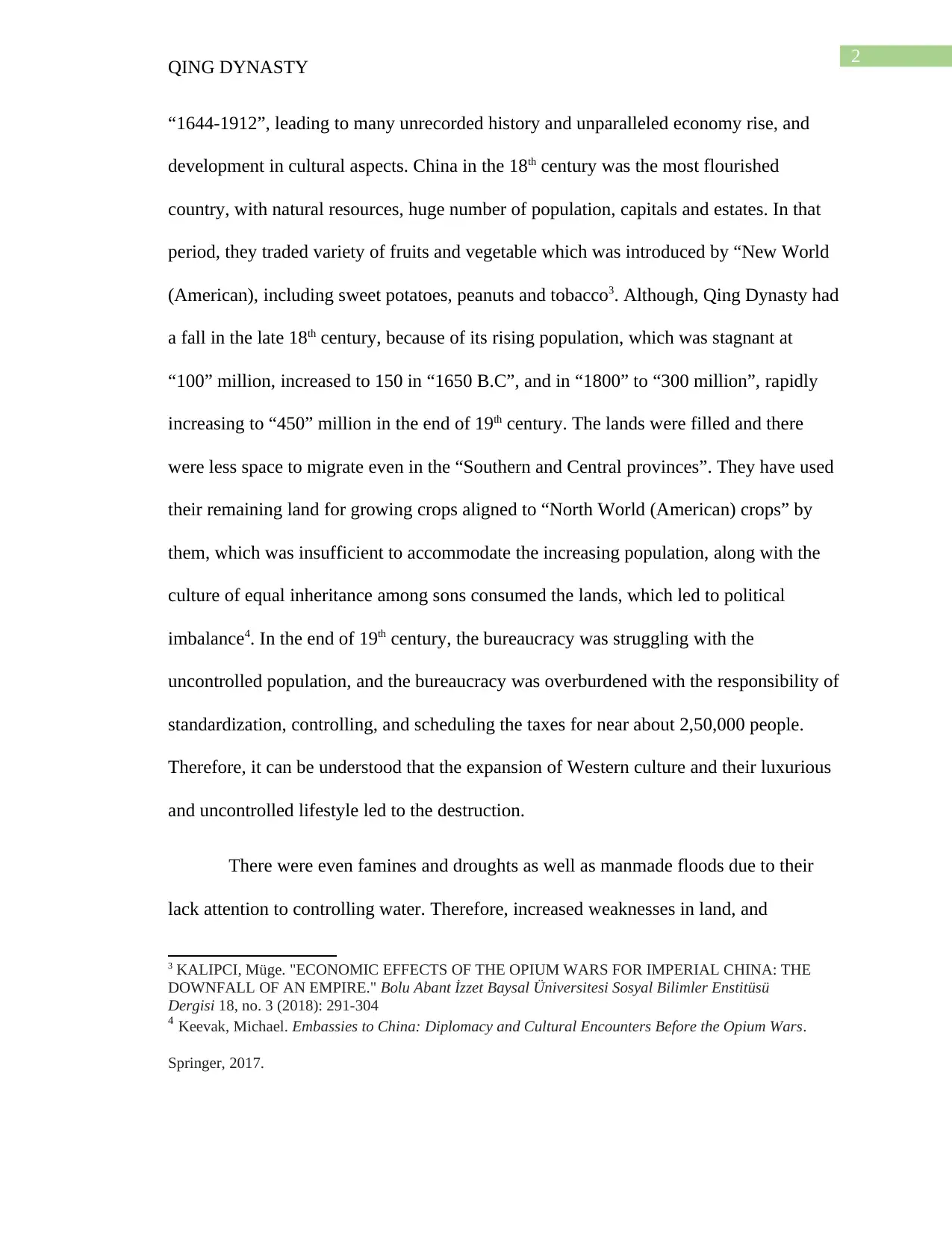
2
QING DYNASTY
“1644-1912”, leading to many unrecorded history and unparalleled economy rise, and
development in cultural aspects. China in the 18th century was the most flourished
country, with natural resources, huge number of population, capitals and estates. In that
period, they traded variety of fruits and vegetable which was introduced by “New World
(American), including sweet potatoes, peanuts and tobacco3. Although, Qing Dynasty had
a fall in the late 18th century, because of its rising population, which was stagnant at
“100” million, increased to 150 in “1650 B.C”, and in “1800” to “300 million”, rapidly
increasing to “450” million in the end of 19th century. The lands were filled and there
were less space to migrate even in the “Southern and Central provinces”. They have used
their remaining land for growing crops aligned to “North World (American) crops” by
them, which was insufficient to accommodate the increasing population, along with the
culture of equal inheritance among sons consumed the lands, which led to political
imbalance4. In the end of 19th century, the bureaucracy was struggling with the
uncontrolled population, and the bureaucracy was overburdened with the responsibility of
standardization, controlling, and scheduling the taxes for near about 2,50,000 people.
Therefore, it can be understood that the expansion of Western culture and their luxurious
and uncontrolled lifestyle led to the destruction.
There were even famines and droughts as well as manmade floods due to their
lack attention to controlling water. Therefore, increased weaknesses in land, and
3 KALIPCI, Müge. "ECONOMIC EFFECTS OF THE OPIUM WARS FOR IMPERIAL CHINA: THE
DOWNFALL OF AN EMPIRE." Bolu Abant İzzet Baysal Üniversitesi Sosyal Bilimler Enstitüsü
Dergisi 18, no. 3 (2018): 291-304
4 Keevak, Michael. Embassies to China: Diplomacy and Cultural Encounters Before the Opium Wars.
Springer, 2017.
QING DYNASTY
“1644-1912”, leading to many unrecorded history and unparalleled economy rise, and
development in cultural aspects. China in the 18th century was the most flourished
country, with natural resources, huge number of population, capitals and estates. In that
period, they traded variety of fruits and vegetable which was introduced by “New World
(American), including sweet potatoes, peanuts and tobacco3. Although, Qing Dynasty had
a fall in the late 18th century, because of its rising population, which was stagnant at
“100” million, increased to 150 in “1650 B.C”, and in “1800” to “300 million”, rapidly
increasing to “450” million in the end of 19th century. The lands were filled and there
were less space to migrate even in the “Southern and Central provinces”. They have used
their remaining land for growing crops aligned to “North World (American) crops” by
them, which was insufficient to accommodate the increasing population, along with the
culture of equal inheritance among sons consumed the lands, which led to political
imbalance4. In the end of 19th century, the bureaucracy was struggling with the
uncontrolled population, and the bureaucracy was overburdened with the responsibility of
standardization, controlling, and scheduling the taxes for near about 2,50,000 people.
Therefore, it can be understood that the expansion of Western culture and their luxurious
and uncontrolled lifestyle led to the destruction.
There were even famines and droughts as well as manmade floods due to their
lack attention to controlling water. Therefore, increased weaknesses in land, and
3 KALIPCI, Müge. "ECONOMIC EFFECTS OF THE OPIUM WARS FOR IMPERIAL CHINA: THE
DOWNFALL OF AN EMPIRE." Bolu Abant İzzet Baysal Üniversitesi Sosyal Bilimler Enstitüsü
Dergisi 18, no. 3 (2018): 291-304
4 Keevak, Michael. Embassies to China: Diplomacy and Cultural Encounters Before the Opium Wars.
Springer, 2017.
⊘ This is a preview!⊘
Do you want full access?
Subscribe today to unlock all pages.

Trusted by 1+ million students worldwide
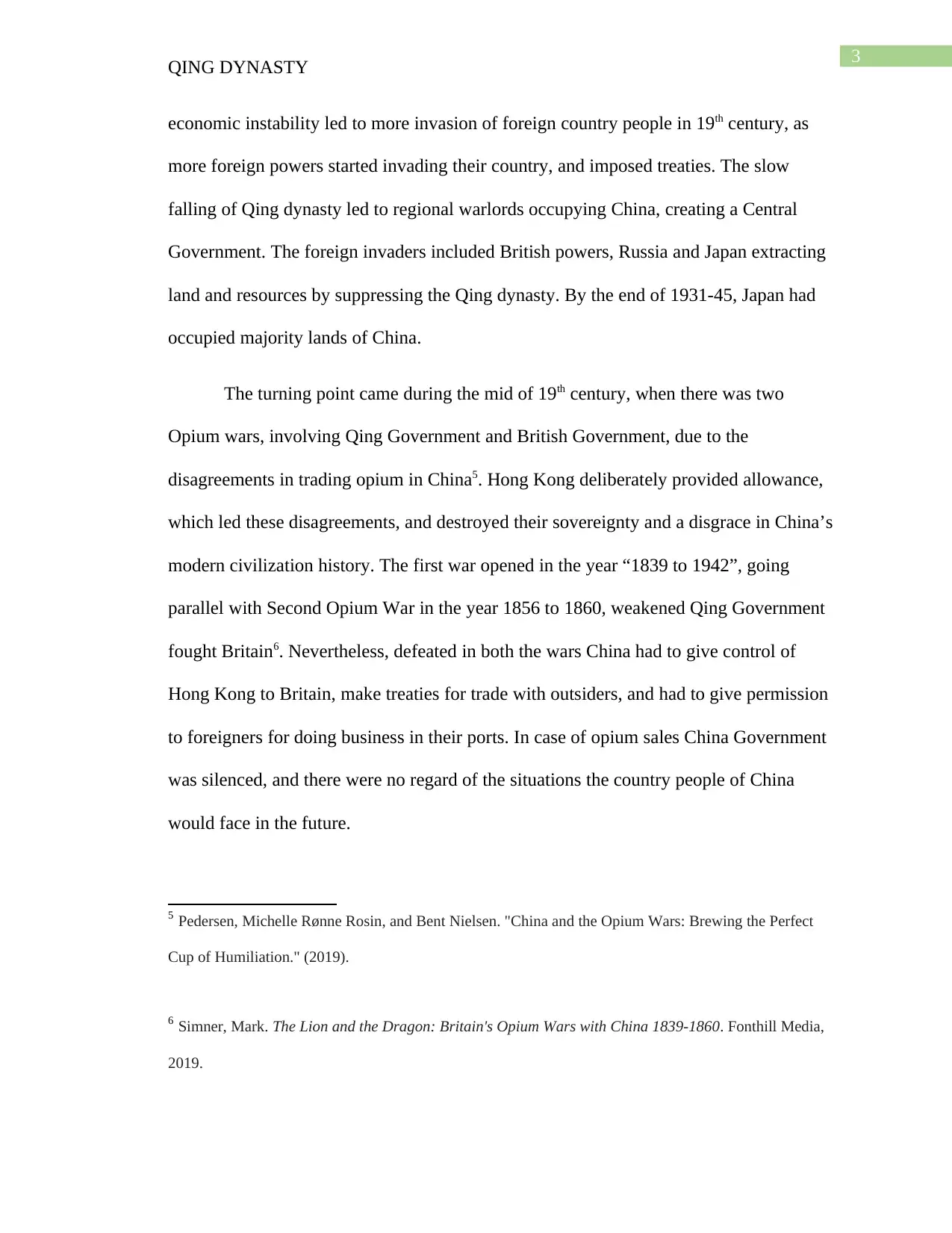
3
QING DYNASTY
economic instability led to more invasion of foreign country people in 19th century, as
more foreign powers started invading their country, and imposed treaties. The slow
falling of Qing dynasty led to regional warlords occupying China, creating a Central
Government. The foreign invaders included British powers, Russia and Japan extracting
land and resources by suppressing the Qing dynasty. By the end of 1931-45, Japan had
occupied majority lands of China.
The turning point came during the mid of 19th century, when there was two
Opium wars, involving Qing Government and British Government, due to the
disagreements in trading opium in China5. Hong Kong deliberately provided allowance,
which led these disagreements, and destroyed their sovereignty and a disgrace in China’s
modern civilization history. The first war opened in the year “1839 to 1942”, going
parallel with Second Opium War in the year 1856 to 1860, weakened Qing Government
fought Britain6. Nevertheless, defeated in both the wars China had to give control of
Hong Kong to Britain, make treaties for trade with outsiders, and had to give permission
to foreigners for doing business in their ports. In case of opium sales China Government
was silenced, and there were no regard of the situations the country people of China
would face in the future.
5 Pedersen, Michelle Rønne Rosin, and Bent Nielsen. "China and the Opium Wars: Brewing the Perfect
Cup of Humiliation." (2019).
6 Simner, Mark. The Lion and the Dragon: Britain's Opium Wars with China 1839-1860. Fonthill Media,
2019.
QING DYNASTY
economic instability led to more invasion of foreign country people in 19th century, as
more foreign powers started invading their country, and imposed treaties. The slow
falling of Qing dynasty led to regional warlords occupying China, creating a Central
Government. The foreign invaders included British powers, Russia and Japan extracting
land and resources by suppressing the Qing dynasty. By the end of 1931-45, Japan had
occupied majority lands of China.
The turning point came during the mid of 19th century, when there was two
Opium wars, involving Qing Government and British Government, due to the
disagreements in trading opium in China5. Hong Kong deliberately provided allowance,
which led these disagreements, and destroyed their sovereignty and a disgrace in China’s
modern civilization history. The first war opened in the year “1839 to 1942”, going
parallel with Second Opium War in the year 1856 to 1860, weakened Qing Government
fought Britain6. Nevertheless, defeated in both the wars China had to give control of
Hong Kong to Britain, make treaties for trade with outsiders, and had to give permission
to foreigners for doing business in their ports. In case of opium sales China Government
was silenced, and there were no regard of the situations the country people of China
would face in the future.
5 Pedersen, Michelle Rønne Rosin, and Bent Nielsen. "China and the Opium Wars: Brewing the Perfect
Cup of Humiliation." (2019).
6 Simner, Mark. The Lion and the Dragon: Britain's Opium Wars with China 1839-1860. Fonthill Media,
2019.
Paraphrase This Document
Need a fresh take? Get an instant paraphrase of this document with our AI Paraphraser
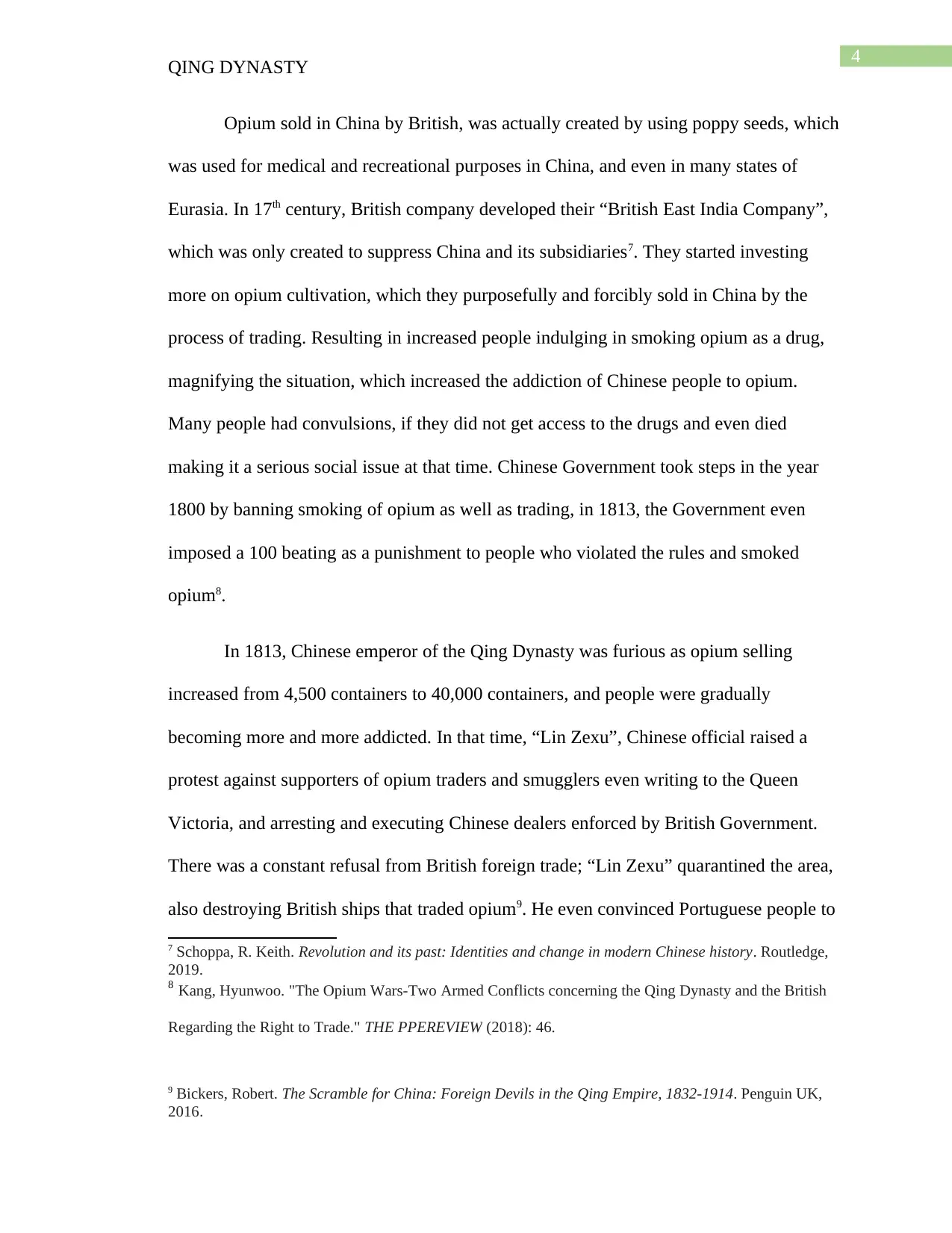
4
QING DYNASTY
Opium sold in China by British, was actually created by using poppy seeds, which
was used for medical and recreational purposes in China, and even in many states of
Eurasia. In 17th century, British company developed their “British East India Company”,
which was only created to suppress China and its subsidiaries7. They started investing
more on opium cultivation, which they purposefully and forcibly sold in China by the
process of trading. Resulting in increased people indulging in smoking opium as a drug,
magnifying the situation, which increased the addiction of Chinese people to opium.
Many people had convulsions, if they did not get access to the drugs and even died
making it a serious social issue at that time. Chinese Government took steps in the year
1800 by banning smoking of opium as well as trading, in 1813, the Government even
imposed a 100 beating as a punishment to people who violated the rules and smoked
opium8.
In 1813, Chinese emperor of the Qing Dynasty was furious as opium selling
increased from 4,500 containers to 40,000 containers, and people were gradually
becoming more and more addicted. In that time, “Lin Zexu”, Chinese official raised a
protest against supporters of opium traders and smugglers even writing to the Queen
Victoria, and arresting and executing Chinese dealers enforced by British Government.
There was a constant refusal from British foreign trade; “Lin Zexu” quarantined the area,
also destroying British ships that traded opium9. He even convinced Portuguese people to
7 Schoppa, R. Keith. Revolution and its past: Identities and change in modern Chinese history. Routledge,
2019.
8 Kang, Hyunwoo. "The Opium Wars-Two Armed Conflicts concerning the Qing Dynasty and the British
Regarding the Right to Trade." THE PPEREVIEW (2018): 46.
9 Bickers, Robert. The Scramble for China: Foreign Devils in the Qing Empire, 1832-1914. Penguin UK,
2016.
QING DYNASTY
Opium sold in China by British, was actually created by using poppy seeds, which
was used for medical and recreational purposes in China, and even in many states of
Eurasia. In 17th century, British company developed their “British East India Company”,
which was only created to suppress China and its subsidiaries7. They started investing
more on opium cultivation, which they purposefully and forcibly sold in China by the
process of trading. Resulting in increased people indulging in smoking opium as a drug,
magnifying the situation, which increased the addiction of Chinese people to opium.
Many people had convulsions, if they did not get access to the drugs and even died
making it a serious social issue at that time. Chinese Government took steps in the year
1800 by banning smoking of opium as well as trading, in 1813, the Government even
imposed a 100 beating as a punishment to people who violated the rules and smoked
opium8.
In 1813, Chinese emperor of the Qing Dynasty was furious as opium selling
increased from 4,500 containers to 40,000 containers, and people were gradually
becoming more and more addicted. In that time, “Lin Zexu”, Chinese official raised a
protest against supporters of opium traders and smugglers even writing to the Queen
Victoria, and arresting and executing Chinese dealers enforced by British Government.
There was a constant refusal from British foreign trade; “Lin Zexu” quarantined the area,
also destroying British ships that traded opium9. He even convinced Portuguese people to
7 Schoppa, R. Keith. Revolution and its past: Identities and change in modern Chinese history. Routledge,
2019.
8 Kang, Hyunwoo. "The Opium Wars-Two Armed Conflicts concerning the Qing Dynasty and the British
Regarding the Right to Trade." THE PPEREVIEW (2018): 46.
9 Bickers, Robert. The Scramble for China: Foreign Devils in the Qing Empire, 1832-1914. Penguin UK,
2016.
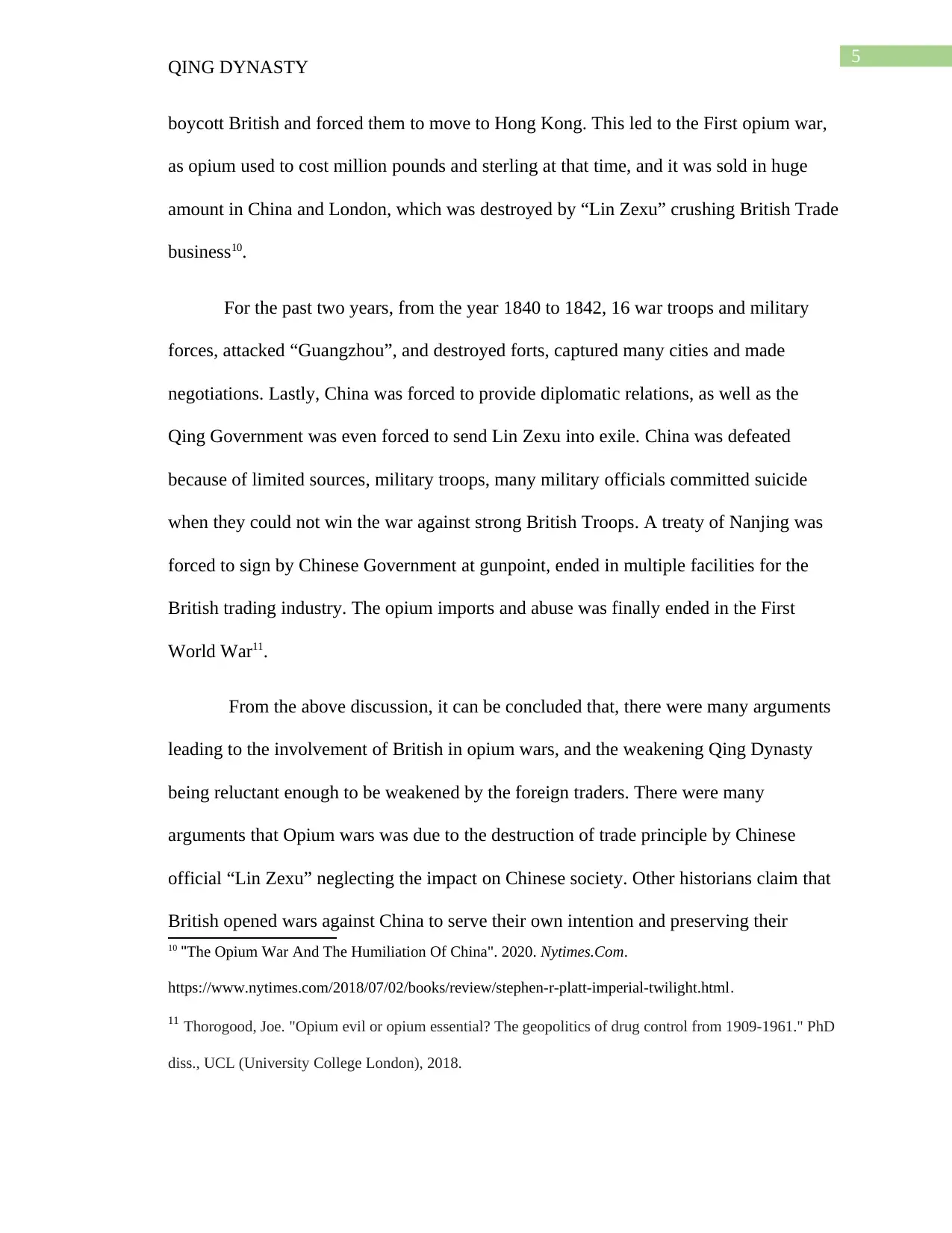
5
QING DYNASTY
boycott British and forced them to move to Hong Kong. This led to the First opium war,
as opium used to cost million pounds and sterling at that time, and it was sold in huge
amount in China and London, which was destroyed by “Lin Zexu” crushing British Trade
business10.
For the past two years, from the year 1840 to 1842, 16 war troops and military
forces, attacked “Guangzhou”, and destroyed forts, captured many cities and made
negotiations. Lastly, China was forced to provide diplomatic relations, as well as the
Qing Government was even forced to send Lin Zexu into exile. China was defeated
because of limited sources, military troops, many military officials committed suicide
when they could not win the war against strong British Troops. A treaty of Nanjing was
forced to sign by Chinese Government at gunpoint, ended in multiple facilities for the
British trading industry. The opium imports and abuse was finally ended in the First
World War11.
From the above discussion, it can be concluded that, there were many arguments
leading to the involvement of British in opium wars, and the weakening Qing Dynasty
being reluctant enough to be weakened by the foreign traders. There were many
arguments that Opium wars was due to the destruction of trade principle by Chinese
official “Lin Zexu” neglecting the impact on Chinese society. Other historians claim that
British opened wars against China to serve their own intention and preserving their
10 "The Opium War And The Humiliation Of China". 2020. Nytimes.Com.
https://www.nytimes.com/2018/07/02/books/review/stephen-r-platt-imperial-twilight.html.
11 Thorogood, Joe. "Opium evil or opium essential? The geopolitics of drug control from 1909-1961." PhD
diss., UCL (University College London), 2018.
QING DYNASTY
boycott British and forced them to move to Hong Kong. This led to the First opium war,
as opium used to cost million pounds and sterling at that time, and it was sold in huge
amount in China and London, which was destroyed by “Lin Zexu” crushing British Trade
business10.
For the past two years, from the year 1840 to 1842, 16 war troops and military
forces, attacked “Guangzhou”, and destroyed forts, captured many cities and made
negotiations. Lastly, China was forced to provide diplomatic relations, as well as the
Qing Government was even forced to send Lin Zexu into exile. China was defeated
because of limited sources, military troops, many military officials committed suicide
when they could not win the war against strong British Troops. A treaty of Nanjing was
forced to sign by Chinese Government at gunpoint, ended in multiple facilities for the
British trading industry. The opium imports and abuse was finally ended in the First
World War11.
From the above discussion, it can be concluded that, there were many arguments
leading to the involvement of British in opium wars, and the weakening Qing Dynasty
being reluctant enough to be weakened by the foreign traders. There were many
arguments that Opium wars was due to the destruction of trade principle by Chinese
official “Lin Zexu” neglecting the impact on Chinese society. Other historians claim that
British opened wars against China to serve their own intention and preserving their
10 "The Opium War And The Humiliation Of China". 2020. Nytimes.Com.
https://www.nytimes.com/2018/07/02/books/review/stephen-r-platt-imperial-twilight.html.
11 Thorogood, Joe. "Opium evil or opium essential? The geopolitics of drug control from 1909-1961." PhD
diss., UCL (University College London), 2018.
⊘ This is a preview!⊘
Do you want full access?
Subscribe today to unlock all pages.

Trusted by 1+ million students worldwide

6
QING DYNASTY
reputation. Although, according to the perspective of China society, the wars ended the
“Imperial China and its society”. The war also has huge impact on the society by leading
addiction of opium affecting many people.
QING DYNASTY
reputation. Although, according to the perspective of China society, the wars ended the
“Imperial China and its society”. The war also has huge impact on the society by leading
addiction of opium affecting many people.
Paraphrase This Document
Need a fresh take? Get an instant paraphrase of this document with our AI Paraphraser
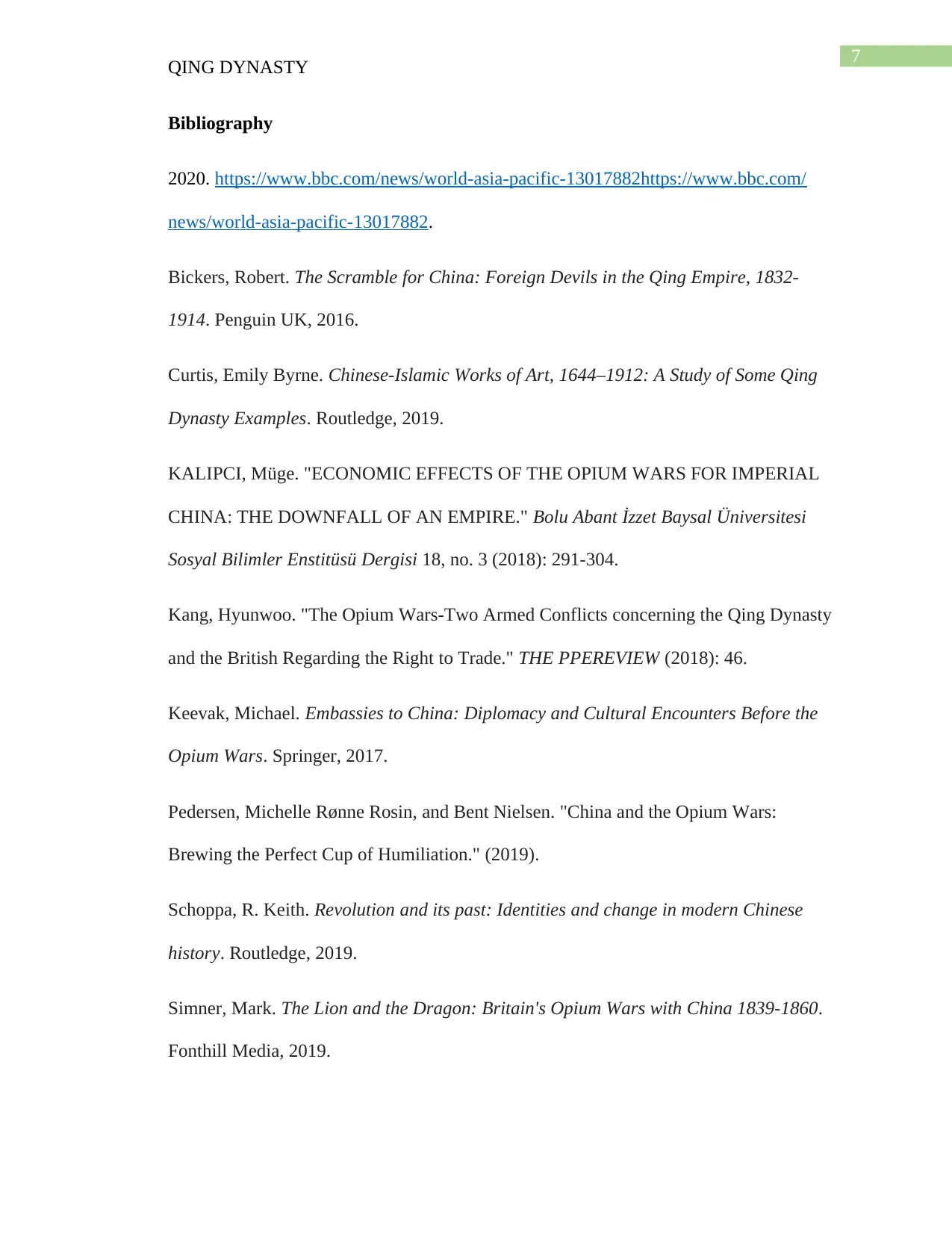
7
QING DYNASTY
Bibliography
2020. https://www.bbc.com/news/world-asia-pacific-13017882https://www.bbc.com/
news/world-asia-pacific-13017882.
Bickers, Robert. The Scramble for China: Foreign Devils in the Qing Empire, 1832-
1914. Penguin UK, 2016.
Curtis, Emily Byrne. Chinese-Islamic Works of Art, 1644–1912: A Study of Some Qing
Dynasty Examples. Routledge, 2019.
KALIPCI, Müge. "ECONOMIC EFFECTS OF THE OPIUM WARS FOR IMPERIAL
CHINA: THE DOWNFALL OF AN EMPIRE." Bolu Abant İzzet Baysal Üniversitesi
Sosyal Bilimler Enstitüsü Dergisi 18, no. 3 (2018): 291-304.
Kang, Hyunwoo. "The Opium Wars-Two Armed Conflicts concerning the Qing Dynasty
and the British Regarding the Right to Trade." THE PPEREVIEW (2018): 46.
Keevak, Michael. Embassies to China: Diplomacy and Cultural Encounters Before the
Opium Wars. Springer, 2017.
Pedersen, Michelle Rønne Rosin, and Bent Nielsen. "China and the Opium Wars:
Brewing the Perfect Cup of Humiliation." (2019).
Schoppa, R. Keith. Revolution and its past: Identities and change in modern Chinese
history. Routledge, 2019.
Simner, Mark. The Lion and the Dragon: Britain's Opium Wars with China 1839-1860.
Fonthill Media, 2019.
QING DYNASTY
Bibliography
2020. https://www.bbc.com/news/world-asia-pacific-13017882https://www.bbc.com/
news/world-asia-pacific-13017882.
Bickers, Robert. The Scramble for China: Foreign Devils in the Qing Empire, 1832-
1914. Penguin UK, 2016.
Curtis, Emily Byrne. Chinese-Islamic Works of Art, 1644–1912: A Study of Some Qing
Dynasty Examples. Routledge, 2019.
KALIPCI, Müge. "ECONOMIC EFFECTS OF THE OPIUM WARS FOR IMPERIAL
CHINA: THE DOWNFALL OF AN EMPIRE." Bolu Abant İzzet Baysal Üniversitesi
Sosyal Bilimler Enstitüsü Dergisi 18, no. 3 (2018): 291-304.
Kang, Hyunwoo. "The Opium Wars-Two Armed Conflicts concerning the Qing Dynasty
and the British Regarding the Right to Trade." THE PPEREVIEW (2018): 46.
Keevak, Michael. Embassies to China: Diplomacy and Cultural Encounters Before the
Opium Wars. Springer, 2017.
Pedersen, Michelle Rønne Rosin, and Bent Nielsen. "China and the Opium Wars:
Brewing the Perfect Cup of Humiliation." (2019).
Schoppa, R. Keith. Revolution and its past: Identities and change in modern Chinese
history. Routledge, 2019.
Simner, Mark. The Lion and the Dragon: Britain's Opium Wars with China 1839-1860.
Fonthill Media, 2019.

8
QING DYNASTY
Thorogood, Joe. "Opium evil or opium essential? The geopolitics of drug control from
1909-1961." PhD diss., UCL (University College London), 2018.
QING DYNASTY
Thorogood, Joe. "Opium evil or opium essential? The geopolitics of drug control from
1909-1961." PhD diss., UCL (University College London), 2018.
⊘ This is a preview!⊘
Do you want full access?
Subscribe today to unlock all pages.

Trusted by 1+ million students worldwide
1 out of 9
Your All-in-One AI-Powered Toolkit for Academic Success.
+13062052269
info@desklib.com
Available 24*7 on WhatsApp / Email
![[object Object]](/_next/static/media/star-bottom.7253800d.svg)
Unlock your academic potential
Copyright © 2020–2025 A2Z Services. All Rights Reserved. Developed and managed by ZUCOL.